University Business Corporate Law: Case Study Analysis
VerifiedAdded on 2022/10/01
|7
|1274
|210
Case Study
AI Summary
This document provides a comprehensive solution to a business corporate law case study. It addresses two short-answer questions concerning the roles and powers of the Australian Securities and Investments Commission (ASIC) and the steps recommended for company registration. The case study analyzes the transition of a business from a partnership to a company, the sale of assets, and the concepts of separate legal entity and limited liability. Additionally, it examines a second case study involving a director's breach of duties, including fiduciary duties and the business judgment rule, assessing potential responsibilities and actions to avoid the situation. The solution references relevant legislation, including the Corporations Act 2001, and case law such as Salomon v Salomon and Aberdeen Railway Co v Blaikie Bros.
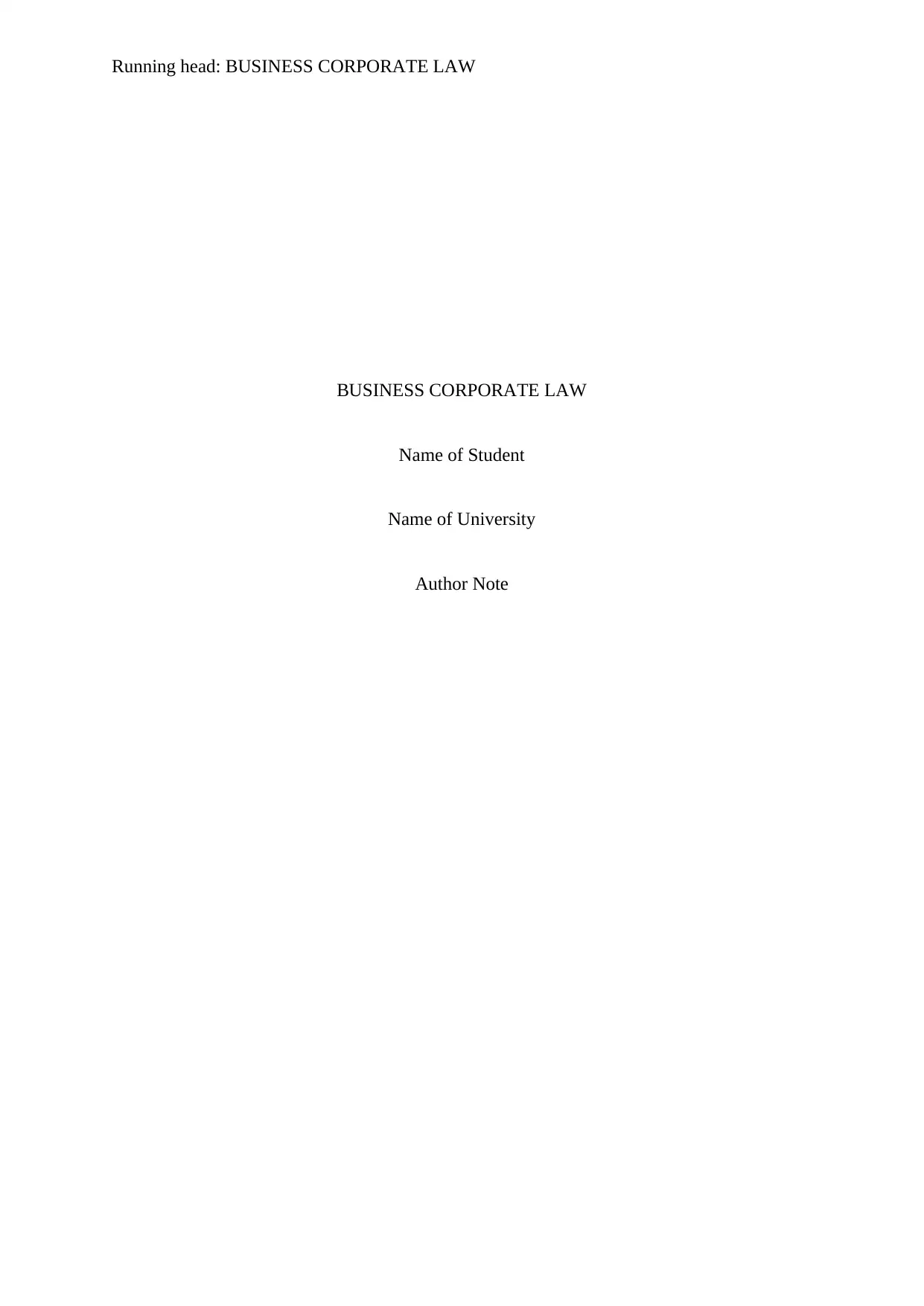
Running head: BUSINESS CORPORATE LAW
BUSINESS CORPORATE LAW
Name of Student
Name of University
Author Note
BUSINESS CORPORATE LAW
Name of Student
Name of University
Author Note
Paraphrase This Document
Need a fresh take? Get an instant paraphrase of this document with our AI Paraphraser
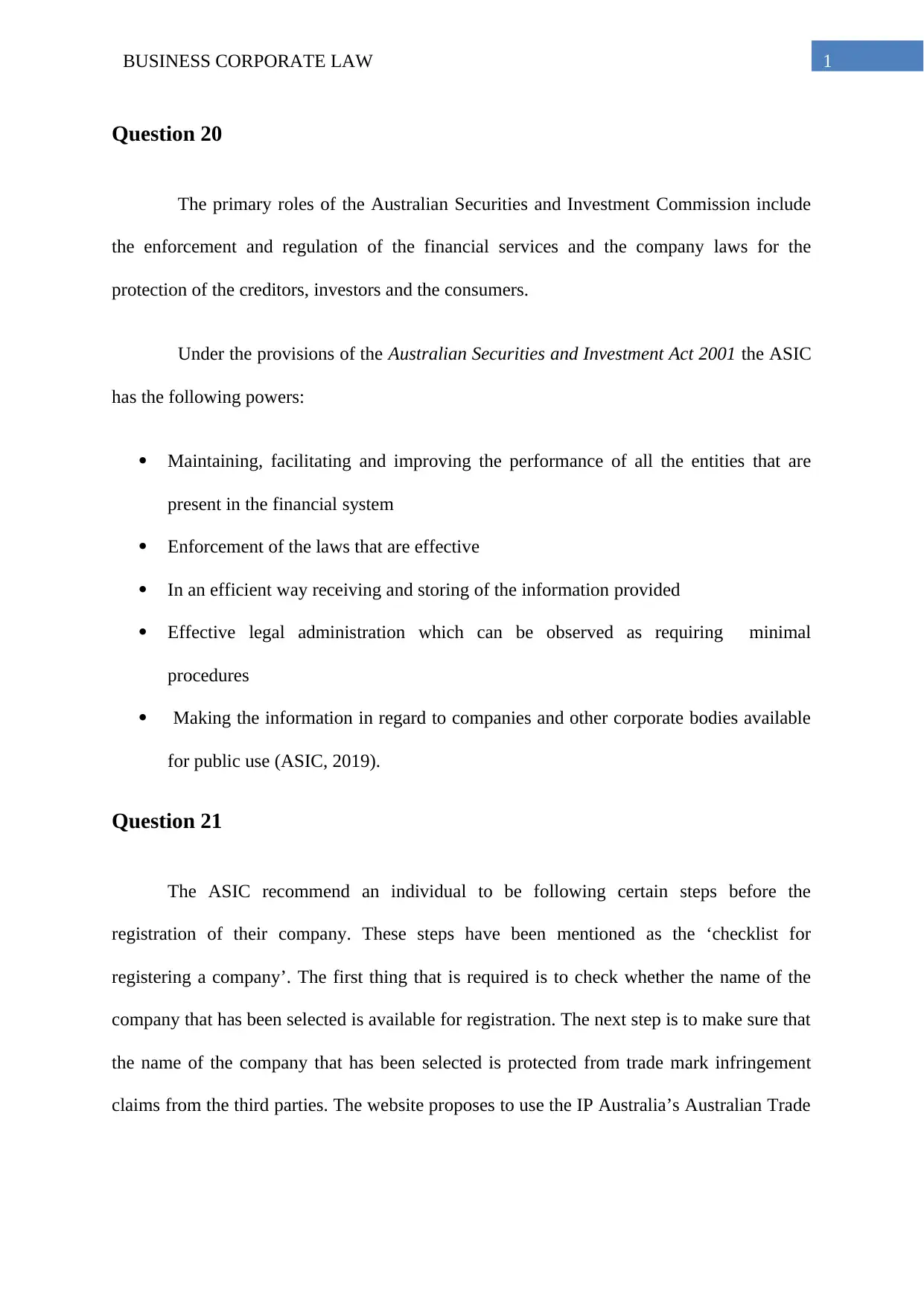
1BUSINESS CORPORATE LAW
Question 20
The primary roles of the Australian Securities and Investment Commission include
the enforcement and regulation of the financial services and the company laws for the
protection of the creditors, investors and the consumers.
Under the provisions of the Australian Securities and Investment Act 2001 the ASIC
has the following powers:
Maintaining, facilitating and improving the performance of all the entities that are
present in the financial system
Enforcement of the laws that are effective
In an efficient way receiving and storing of the information provided
Effective legal administration which can be observed as requiring minimal
procedures
Making the information in regard to companies and other corporate bodies available
for public use (ASIC, 2019).
Question 21
The ASIC recommend an individual to be following certain steps before the
registration of their company. These steps have been mentioned as the ‘checklist for
registering a company’. The first thing that is required is to check whether the name of the
company that has been selected is available for registration. The next step is to make sure that
the name of the company that has been selected is protected from trade mark infringement
claims from the third parties. The website proposes to use the IP Australia’s Australian Trade
Question 20
The primary roles of the Australian Securities and Investment Commission include
the enforcement and regulation of the financial services and the company laws for the
protection of the creditors, investors and the consumers.
Under the provisions of the Australian Securities and Investment Act 2001 the ASIC
has the following powers:
Maintaining, facilitating and improving the performance of all the entities that are
present in the financial system
Enforcement of the laws that are effective
In an efficient way receiving and storing of the information provided
Effective legal administration which can be observed as requiring minimal
procedures
Making the information in regard to companies and other corporate bodies available
for public use (ASIC, 2019).
Question 21
The ASIC recommend an individual to be following certain steps before the
registration of their company. These steps have been mentioned as the ‘checklist for
registering a company’. The first thing that is required is to check whether the name of the
company that has been selected is available for registration. The next step is to make sure that
the name of the company that has been selected is protected from trade mark infringement
claims from the third parties. The website proposes to use the IP Australia’s Australian Trade
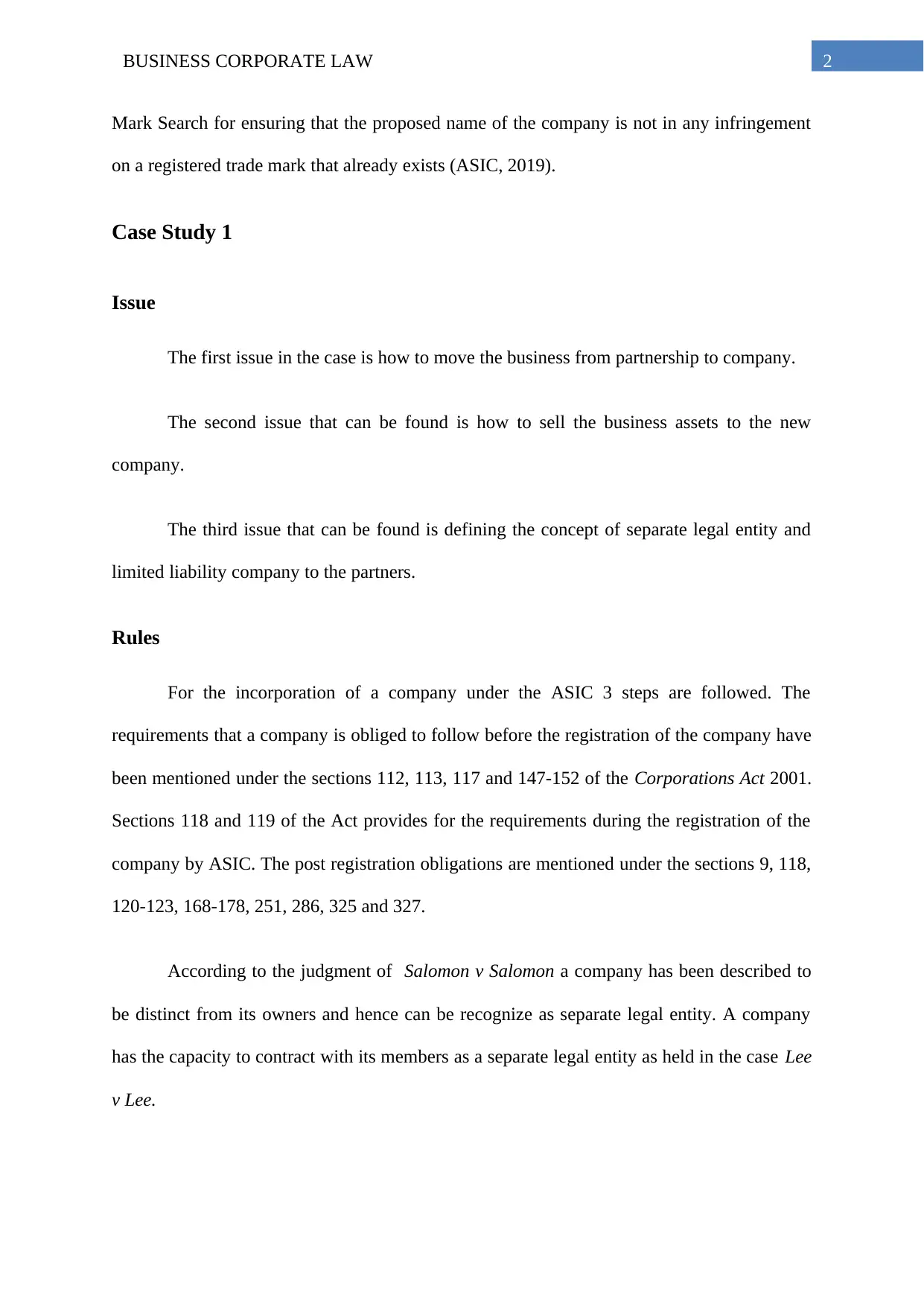
2BUSINESS CORPORATE LAW
Mark Search for ensuring that the proposed name of the company is not in any infringement
on a registered trade mark that already exists (ASIC, 2019).
Case Study 1
Issue
The first issue in the case is how to move the business from partnership to company.
The second issue that can be found is how to sell the business assets to the new
company.
The third issue that can be found is defining the concept of separate legal entity and
limited liability company to the partners.
Rules
For the incorporation of a company under the ASIC 3 steps are followed. The
requirements that a company is obliged to follow before the registration of the company have
been mentioned under the sections 112, 113, 117 and 147-152 of the Corporations Act 2001.
Sections 118 and 119 of the Act provides for the requirements during the registration of the
company by ASIC. The post registration obligations are mentioned under the sections 9, 118,
120-123, 168-178, 251, 286, 325 and 327.
According to the judgment of Salomon v Salomon a company has been described to
be distinct from its owners and hence can be recognize as separate legal entity. A company
has the capacity to contract with its members as a separate legal entity as held in the case Lee
v Lee.
Mark Search for ensuring that the proposed name of the company is not in any infringement
on a registered trade mark that already exists (ASIC, 2019).
Case Study 1
Issue
The first issue in the case is how to move the business from partnership to company.
The second issue that can be found is how to sell the business assets to the new
company.
The third issue that can be found is defining the concept of separate legal entity and
limited liability company to the partners.
Rules
For the incorporation of a company under the ASIC 3 steps are followed. The
requirements that a company is obliged to follow before the registration of the company have
been mentioned under the sections 112, 113, 117 and 147-152 of the Corporations Act 2001.
Sections 118 and 119 of the Act provides for the requirements during the registration of the
company by ASIC. The post registration obligations are mentioned under the sections 9, 118,
120-123, 168-178, 251, 286, 325 and 327.
According to the judgment of Salomon v Salomon a company has been described to
be distinct from its owners and hence can be recognize as separate legal entity. A company
has the capacity to contract with its members as a separate legal entity as held in the case Lee
v Lee.
⊘ This is a preview!⊘
Do you want full access?
Subscribe today to unlock all pages.

Trusted by 1+ million students worldwide
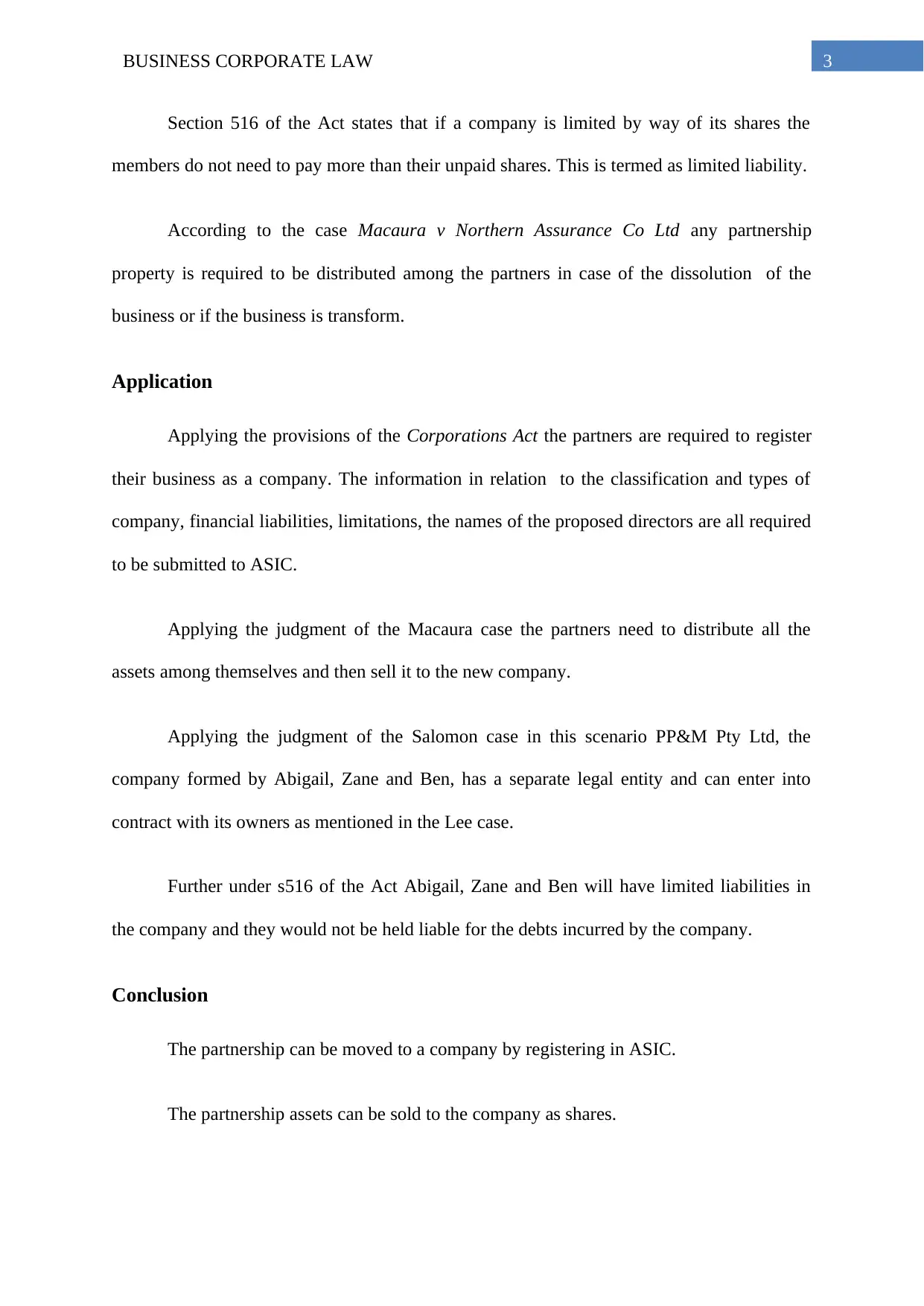
3BUSINESS CORPORATE LAW
Section 516 of the Act states that if a company is limited by way of its shares the
members do not need to pay more than their unpaid shares. This is termed as limited liability.
According to the case Macaura v Northern Assurance Co Ltd any partnership
property is required to be distributed among the partners in case of the dissolution of the
business or if the business is transform.
Application
Applying the provisions of the Corporations Act the partners are required to register
their business as a company. The information in relation to the classification and types of
company, financial liabilities, limitations, the names of the proposed directors are all required
to be submitted to ASIC.
Applying the judgment of the Macaura case the partners need to distribute all the
assets among themselves and then sell it to the new company.
Applying the judgment of the Salomon case in this scenario PP&M Pty Ltd, the
company formed by Abigail, Zane and Ben, has a separate legal entity and can enter into
contract with its owners as mentioned in the Lee case.
Further under s516 of the Act Abigail, Zane and Ben will have limited liabilities in
the company and they would not be held liable for the debts incurred by the company.
Conclusion
The partnership can be moved to a company by registering in ASIC.
The partnership assets can be sold to the company as shares.
Section 516 of the Act states that if a company is limited by way of its shares the
members do not need to pay more than their unpaid shares. This is termed as limited liability.
According to the case Macaura v Northern Assurance Co Ltd any partnership
property is required to be distributed among the partners in case of the dissolution of the
business or if the business is transform.
Application
Applying the provisions of the Corporations Act the partners are required to register
their business as a company. The information in relation to the classification and types of
company, financial liabilities, limitations, the names of the proposed directors are all required
to be submitted to ASIC.
Applying the judgment of the Macaura case the partners need to distribute all the
assets among themselves and then sell it to the new company.
Applying the judgment of the Salomon case in this scenario PP&M Pty Ltd, the
company formed by Abigail, Zane and Ben, has a separate legal entity and can enter into
contract with its owners as mentioned in the Lee case.
Further under s516 of the Act Abigail, Zane and Ben will have limited liabilities in
the company and they would not be held liable for the debts incurred by the company.
Conclusion
The partnership can be moved to a company by registering in ASIC.
The partnership assets can be sold to the company as shares.
Paraphrase This Document
Need a fresh take? Get an instant paraphrase of this document with our AI Paraphraser
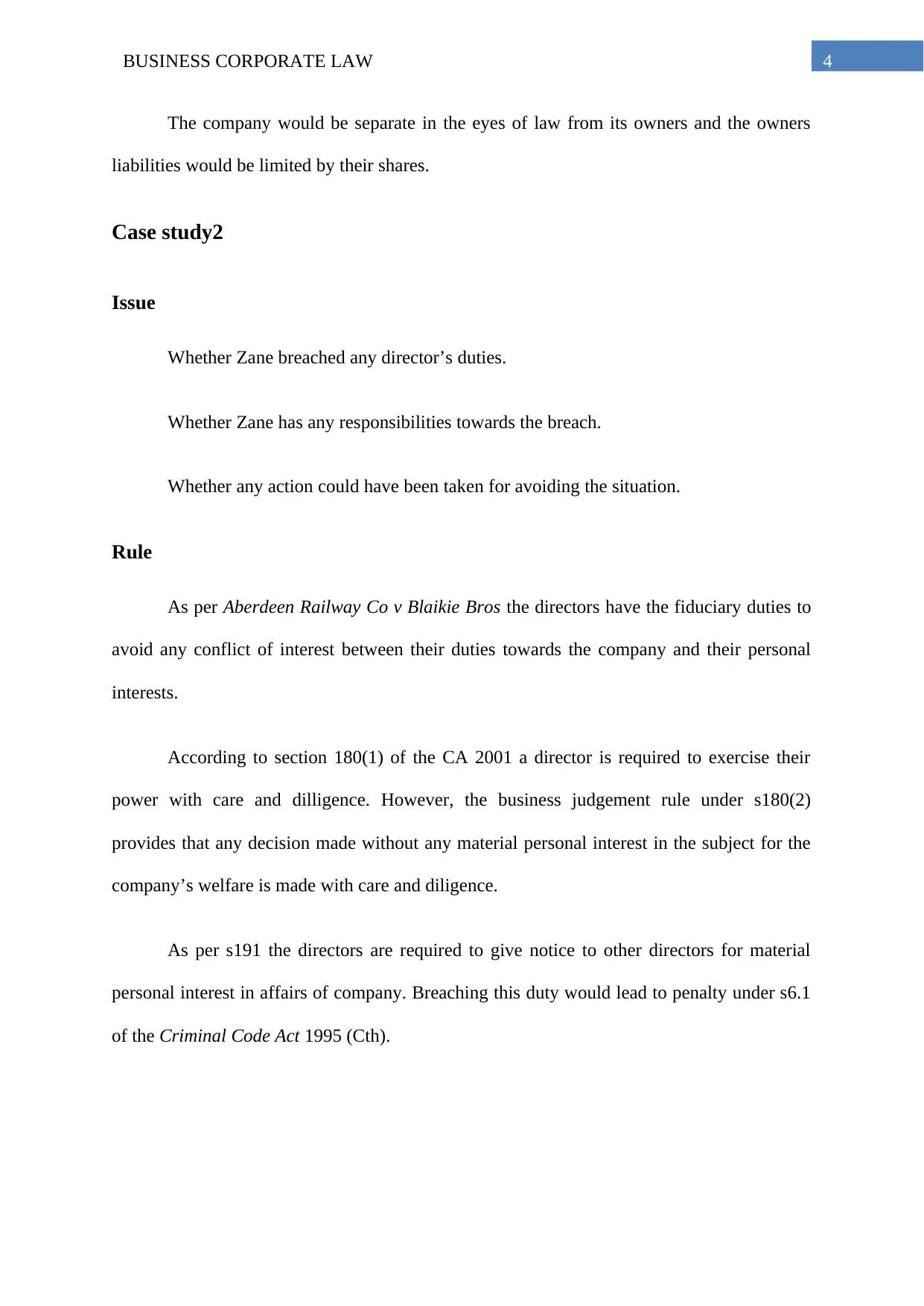
4BUSINESS CORPORATE LAW
The company would be separate in the eyes of law from its owners and the owners
liabilities would be limited by their shares.
Case study2
Issue
Whether Zane breached any director’s duties.
Whether Zane has any responsibilities towards the breach.
Whether any action could have been taken for avoiding the situation.
Rule
As per Aberdeen Railway Co v Blaikie Bros the directors have the fiduciary duties to
avoid any conflict of interest between their duties towards the company and their personal
interests.
According to section 180(1) of the CA 2001 a director is required to exercise their
power with care and dilligence. However, the business judgement rule under s180(2)
provides that any decision made without any material personal interest in the subject for the
company’s welfare is made with care and diligence.
As per s191 the directors are required to give notice to other directors for material
personal interest in affairs of company. Breaching this duty would lead to penalty under s6.1
of the Criminal Code Act 1995 (Cth).
The company would be separate in the eyes of law from its owners and the owners
liabilities would be limited by their shares.
Case study2
Issue
Whether Zane breached any director’s duties.
Whether Zane has any responsibilities towards the breach.
Whether any action could have been taken for avoiding the situation.
Rule
As per Aberdeen Railway Co v Blaikie Bros the directors have the fiduciary duties to
avoid any conflict of interest between their duties towards the company and their personal
interests.
According to section 180(1) of the CA 2001 a director is required to exercise their
power with care and dilligence. However, the business judgement rule under s180(2)
provides that any decision made without any material personal interest in the subject for the
company’s welfare is made with care and diligence.
As per s191 the directors are required to give notice to other directors for material
personal interest in affairs of company. Breaching this duty would lead to penalty under s6.1
of the Criminal Code Act 1995 (Cth).
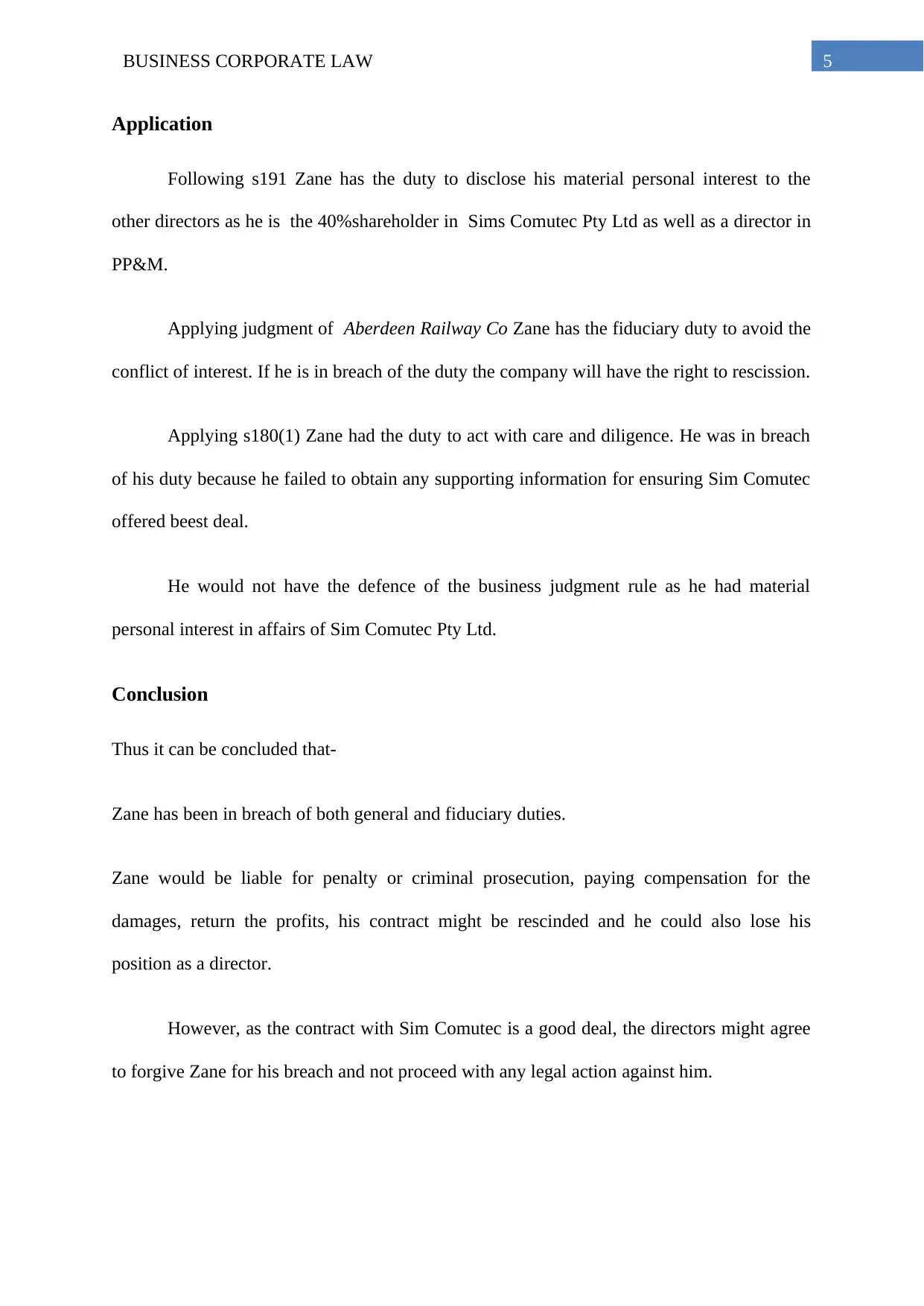
5BUSINESS CORPORATE LAW
Application
Following s191 Zane has the duty to disclose his material personal interest to the
other directors as he is the 40%shareholder in Sims Comutec Pty Ltd as well as a director in
PP&M.
Applying judgment of Aberdeen Railway Co Zane has the fiduciary duty to avoid the
conflict of interest. If he is in breach of the duty the company will have the right to rescission.
Applying s180(1) Zane had the duty to act with care and diligence. He was in breach
of his duty because he failed to obtain any supporting information for ensuring Sim Comutec
offered beest deal.
He would not have the defence of the business judgment rule as he had material
personal interest in affairs of Sim Comutec Pty Ltd.
Conclusion
Thus it can be concluded that-
Zane has been in breach of both general and fiduciary duties.
Zane would be liable for penalty or criminal prosecution, paying compensation for the
damages, return the profits, his contract might be rescinded and he could also lose his
position as a director.
However, as the contract with Sim Comutec is a good deal, the directors might agree
to forgive Zane for his breach and not proceed with any legal action against him.
Application
Following s191 Zane has the duty to disclose his material personal interest to the
other directors as he is the 40%shareholder in Sims Comutec Pty Ltd as well as a director in
PP&M.
Applying judgment of Aberdeen Railway Co Zane has the fiduciary duty to avoid the
conflict of interest. If he is in breach of the duty the company will have the right to rescission.
Applying s180(1) Zane had the duty to act with care and diligence. He was in breach
of his duty because he failed to obtain any supporting information for ensuring Sim Comutec
offered beest deal.
He would not have the defence of the business judgment rule as he had material
personal interest in affairs of Sim Comutec Pty Ltd.
Conclusion
Thus it can be concluded that-
Zane has been in breach of both general and fiduciary duties.
Zane would be liable for penalty or criminal prosecution, paying compensation for the
damages, return the profits, his contract might be rescinded and he could also lose his
position as a director.
However, as the contract with Sim Comutec is a good deal, the directors might agree
to forgive Zane for his breach and not proceed with any legal action against him.
⊘ This is a preview!⊘
Do you want full access?
Subscribe today to unlock all pages.

Trusted by 1+ million students worldwide
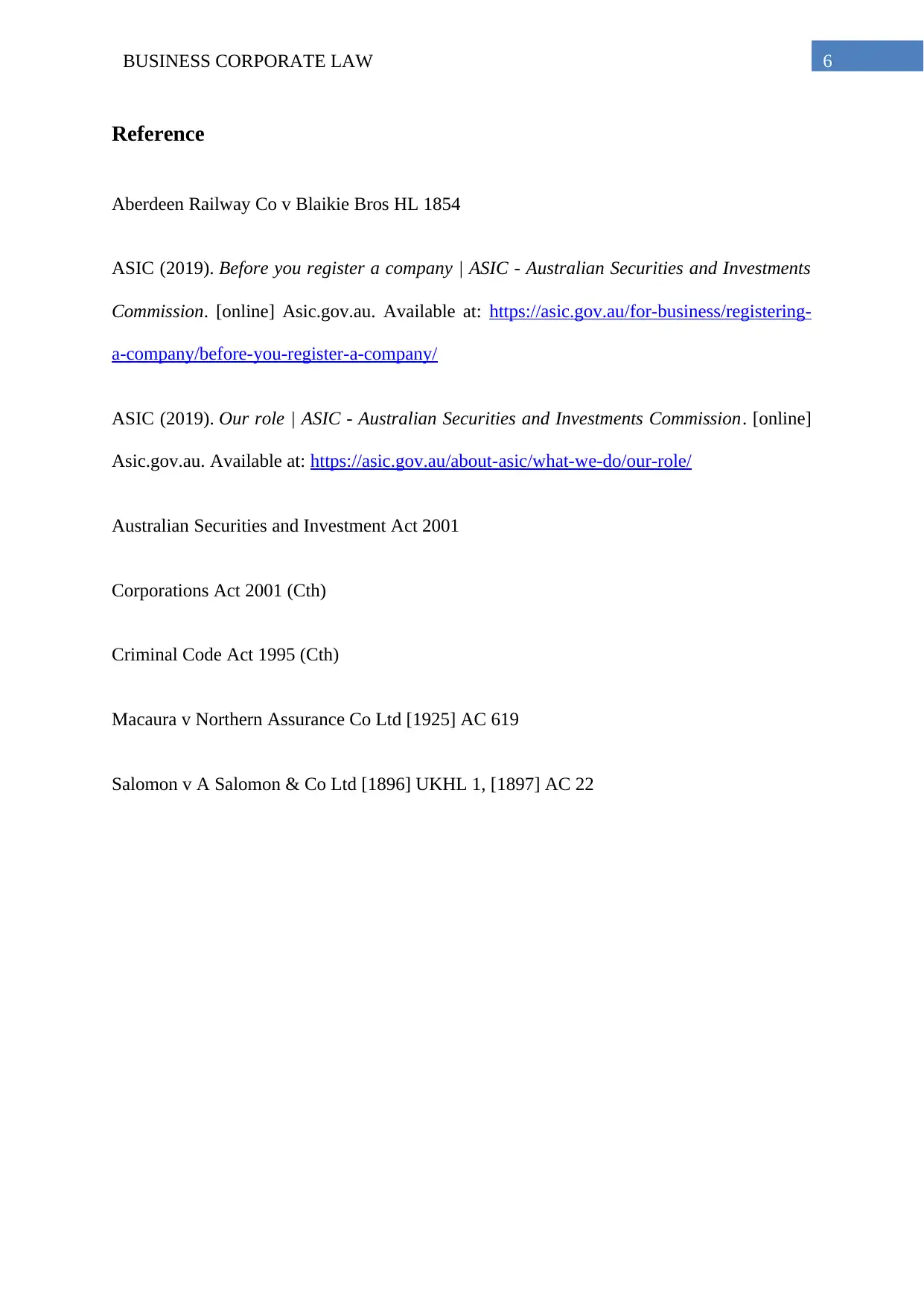
6BUSINESS CORPORATE LAW
Reference
Aberdeen Railway Co v Blaikie Bros HL 1854
ASIC (2019). Before you register a company | ASIC - Australian Securities and Investments
Commission. [online] Asic.gov.au. Available at: https://asic.gov.au/for-business/registering-
a-company/before-you-register-a-company/
ASIC (2019). Our role | ASIC - Australian Securities and Investments Commission. [online]
Asic.gov.au. Available at: https://asic.gov.au/about-asic/what-we-do/our-role/
Australian Securities and Investment Act 2001
Corporations Act 2001 (Cth)
Criminal Code Act 1995 (Cth)
Macaura v Northern Assurance Co Ltd [1925] AC 619
Salomon v A Salomon & Co Ltd [1896] UKHL 1, [1897] AC 22
Reference
Aberdeen Railway Co v Blaikie Bros HL 1854
ASIC (2019). Before you register a company | ASIC - Australian Securities and Investments
Commission. [online] Asic.gov.au. Available at: https://asic.gov.au/for-business/registering-
a-company/before-you-register-a-company/
ASIC (2019). Our role | ASIC - Australian Securities and Investments Commission. [online]
Asic.gov.au. Available at: https://asic.gov.au/about-asic/what-we-do/our-role/
Australian Securities and Investment Act 2001
Corporations Act 2001 (Cth)
Criminal Code Act 1995 (Cth)
Macaura v Northern Assurance Co Ltd [1925] AC 619
Salomon v A Salomon & Co Ltd [1896] UKHL 1, [1897] AC 22
1 out of 7
Related Documents
Your All-in-One AI-Powered Toolkit for Academic Success.
+13062052269
info@desklib.com
Available 24*7 on WhatsApp / Email
![[object Object]](/_next/static/media/star-bottom.7253800d.svg)
Unlock your academic potential
Copyright © 2020–2026 A2Z Services. All Rights Reserved. Developed and managed by ZUCOL.





